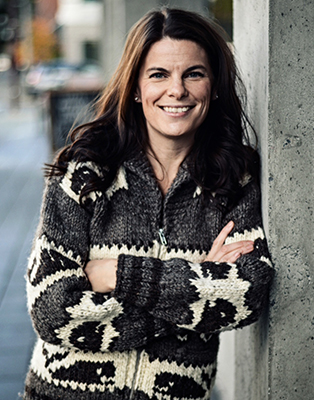June 21st is National Aboriginal Day – a day of celebration that recognizes the heritage, diversity, contributions and achievements of Indigenous people across Canada. Shannon Waters is Coast Salish and a member of the Stz’uminus First Nation on Vancouver Island. After completing medical school at UBC, Dr. Waters went on to train at the Indigenous site of UBC’s family medicine residency program, followed by an additional residency in public health and preventative medicine.
Today, Dr. Waters is committed to improving First Nations health as a Clinical Assistant Professor at UBC’s School of Population and Public Health, as well as the Aboriginal Medical Director for the Vancouver Island Health Authority and the Acting Aboriginal Physician Advisor at the Office of the Provincial Health Officer.
She also has another very important role – mother.
We sat down with Dr. Waters to talk about her work, how she stays balanced and what advice she would offer to prospective students wanting to pursue a career in research.

Shannon Waters
As a family physician in Duncan, B.C., what sparked your interest to go back to school to pursue research in public health and preventative medicine?
I was unsure what area I wanted to specialize in during medical school, but knew that I wanted to help people. After spending two years working in my home community as a family physician, I began to feel frustrated with the fact that I was seeing a lot of people after they had become sick. So I went back for more training in public health and preventative medicine to help keep people healthy in the first place.
That was my driving desire and I don’t think I would have realized that had I not taken that time to be a family physician.
What are you working on right now?
I’m part of several teams looking at province-wide programs, policies and endeavours to improve First Nations health.
One area in particular that we are focused on is Aboriginal maternity care and the ability of Indigenous women to choose where they want to give birth. The North Island is quite rural and in a lot of instances women are told that they will have to go south to deliver their babies – usually to Campbell River. Some of the research we are working on – with Jude Kornelsen, Assistant Professor for the Department of Family Practice and Co-Director for the Centre for Rural Health Research and with the First Nations Health Authority – is with young Kwakwaka’wakw mothers and how these mothers feel about the lack of choice, and what fuels someone’s decision to want to have their baby in their home community or elsewhere.
As an Indigenous person, we often have connections to the land and we want our young ones to be born in the territory that they are from. So there are cultural implications to these choices. It’s not that every Indigenous woman would choose to have their baby in the North Island, but when that choice is taken away, it can have down reaching implications for the mother and the new family member.
Interestingly, this research is carrying on from a similar project I did as a family practice resident 12-years-ago in Alert Bay. It’s quite neat that, years later, I am working with the health authority to try to help sustain maternity services in the North Islands and working with Kwakwaka’wakw moms about what is important to them, and how we can make maternity care services more accessible and culturally appropriate so that birth can be a better experience for everyone involved.
What advice would you offer prospective students wanting to pursue research as a career?
Don’t be scared to try your first research project. I think the word ‘researcher’ feels very loaded and it feels like you have to have all these skills to be able to do it. We all know that there has been a history of research with Indigenous peoples that has not gone greatly, but that doesn’t mean you have to be scared of it altogether.
There are a lot of resources and support at UBC and in Indigenous communities which allowed me to connect with some great research mentors. Reach out for these supports and don’t be afraid to ask questions because there is a growing cohort of amazing people who can provide you with great advice and assistance.
You have many important and demanding roles, how do you keep balanced?
It is a juggling act and I kind of honed my skills of being able to do multiple things overtime – and being a mother has definitely helped me with that. But, I make sure to centre myself and do some self-care every day – whether it’s taking a walk outside or taking a few minutes to meditate. If you really slow-down and centre, even three-minutes can refuel you. I also think that it makes a difference when you are working on something that you are passionate about. My daughter is four-and-a-half months old and I’m going to a meeting with her in Nanaimo and people are always happy to see her. It makes everyone remember the relevancy of what we are doing. And, it’s really powerful when I’m holding my daughter and doing work that can help make her life better in the future.
It’s really about finding something that aligns and feels like it’s bringing all the facets of yourself together to play that role. Finding that relevancy in many different ways.